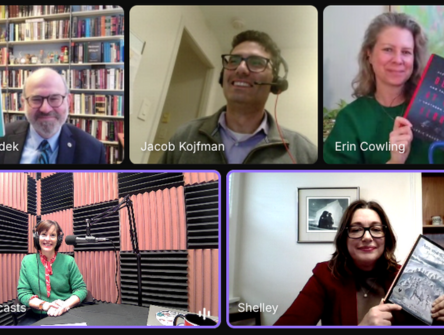After delivering a bombshell ruling quashing Canada's sex work laws in December, the Supreme Court of Canada’s winter session is already under way. This week eight justices heard arguments over the Nadon appointment to the top court.
On the docket for the next six weeks, the top court will hear 32 other cases that range from a lawsuit against the state of Iran to the consideration of the constitutionality of another aspect of the Conservatives' tough-on-crime agenda.
Here are five cases that National is keeping an eye on.
Credit where credit is due
January 23 - 24
The top justices will have to consider one of the early planks of this federal government's tough-on-crime agenda when it hears three cases relating to pre-trial sentencing credits and considers what exactly Parliament intended when it passed the Truth in Sentencing Act in 2009.
One of the three cases that the court will be considering is Her Majesty the Queen v. Sean Summers.
Sean Summers pleaded guilty to manslaughter in 2011 in the death of his infant daughter, after she died of injuries sustained while in his care, and was sentenced to eight years in prison. His defence counsel submitted to the court that the ten-and-a-half months he spent in custody before his trial should count as a credit towards his sentence. That's where the issue arises.
Ottawa amended the provisions around affording pre-trial sentencing credits when it passed C-25 in 2009. Previously, time spent in prison before conviction — often called 'hard time,' as prisoners are afforded few of the benefits and perks of convicted criminals, despite not actually being proven guilty — was dolled out at the judges discretion, often at a ratio of two-to-one. When the federal amendments came into effect, in February 2010, judges could only knock off as many days off an offender's sentence as they spent in custody prior to conviction. The legislation does grant the power to judges to allow one-and-a-half days per day served, provided "the circumstances justify it." The problem is the vague wording of the provision.
The Crown left it to the judge to determine the appropriate credits to apportion to Summers' sentence. The judge found that, due to the inequitable treatment that prisoners receive in pre-trial custody, and their lack of chance for parole while in remand, Summers should get one-and-a-half days worth of credit. The Crown appealed.
The Court of Appeal, however, found that if Parliament had intended to offer limitations on those circumstances, it almost would have said so explicitly in the law. As they didn't, the court ruled it should be left to the sentencing judge to decide. The Crown, again, appealed.
So the top court will have to decide what exactly constitutes those circumstances that the House of Commons laid out in the act.
Jonathan Melo is a lawyer with Supreme Advocacy LLP, the firm that will be arguing the issue before the court (albeit for the similar case of Her Majesty the Queen v. Level Aaron Carvery, the companion case to Summers.)
Melo says that the time served before coming to trial — "dead time" — is essentially "purgatory, or limbo." Those accused usually lack access to counselling programs that may otherwise be part of their sentencing arrangement. As such, judges should have the discretion to credit time served.
Previously, he says, judges also took into consideration exceptional cases where the convicted person may have faced abuse or discrimination while they awaited trial as a basis to award more generous credits.
Even if the justices confirm the Court of Appeal rulings in Summers and Carvery, there is still ample room to clarify rules surrounding thresholds in utilizing the credits.
Where that will fall, Melo says, is anyone's guess.
During the week, the justices will also hear Calvin Clarke v. Her Majesty the Queen, where they will determine whether the Truth in Sentencing Act can be taken to apply retrospectively to those crimes that occurred before the law came into effect.
Hidden credit card fees
February 13 - 14
In what could be a very bad day for the banks, the Supreme Court will be considering whether Quebec's biggest financial institutions have been contravening the province's Consumer Protection Act.
The class action suit takes aim at the companies' practice of charging conversion fees when credit card users purchase items in a foreign currency. The petitioners say that constitutes an undisclosed and separate fee, which Quebec's law forbids, and filed for both restitution and punitive damages. A Quebec Superior Court judge agreed that the banks were in the wrong, and ordered them to pay $155 million, and further ordered all nine of the banks to shell out $25 per cardholder affected. It specifically fined the Amex Bank of Canada for $2.5 million dollars for hiding the contested fee from the Quebec consumer watchdog that initially investigated the complaint.
The Quebec Court of Appeal limited the scope of that decision significantly — it found four of the banks to be in compliance with the act, reduced the judgement to $12.8 million, and dismissed the punitive damages for all the banks except for TD. Both the cardholders and the banks are appealing that decision, leaving the Supreme Court to decide just how much the banks should hand over for imposing the surreptitious fee, if it all.
The banks' case has rested on two points: Quebec law does not apply nationally and that in any event the conversion charge constitutes the net capital, not an additional charge. The Quebec Superior Court, however, found that there is no legislation in the rest of Canada that contradicts Quebec's requirement of the banks to disclose all fees they charge customers, and therefore found the suit to be constitutionally sound.
"We have an excellent case," says Bruce Johnston, a partner at Trudel & Johnston in Montreal. He's representing the consumers in the suit. "We think it's highly unlikely that the banks can be exempt from a consumer protection act in the provinces."
Johnston is also hopeful that the top court will base its decision on the Superior Court's ruling, which found all the banks liable for restitution. He also expects the punitive damages to be reinstated.
Johnston says the banks are hiding behind the traditional separation between credit card company and lending bank. But, he says, that distinction has been almost entirely broken down, and they should be subject to the same provisions as the credit card companies.
The ruling could open the door to add teeth to consumer protection laws in other provinces.
What's in an association?
February 18 - 19
The Supreme Court is also tasked with determining just which associations are allowed to represent the RCMP in collective bargaining, as the professional RCMP organization of officers in Ontario and British Columbia fight to be recognized as legitimate union-like associations.
Currently representing the police force is the Staff Relations Representation Program, an association imposed on them by the RCMP's regulations. The two associations, in Mounted Police Association of Ontario v. Canada, say those regulations contravene section 2(d) of the Canadian Charter of Rights and Freedoms by limiting their ability to set up an independent association.
The Superior Court of Ontario held that the regulations unfairly limit the officers' right to a collective bargaining unit, free from the interference of management.
The Court of Appeal saw it different: While the officers do have the right to bargain collectively, it ruled, the right for that unit to be independent is derivative and therefore not protected.
The decision could impact efforts in the future by other federal employees to wrest control of their collective bargaining process away from statutorily-imposed employee associations.
An unconventional suit
March 18
In what promises to be one of the most interesting cases of this session, Stephan Hashemi is taking on the State of Iran for its role in allegedly torturing, and ultimately killing, his mother.
Hashemi is bringing the lawsuit against Iran on his own behalf, and as executor of the estate of his late mother —photojournalist Zahra Kazemi. The civil liability claim says the theocratic state brought about pain and suffering on his late mother, who died in the state's custody from various injuries. As a result of the psychological trauma, Hashemi claims, he also suffered at the hands of the state.
Iranian authorities moved to have Kazemi (Estate of) c. Islamic Republic of Iran dismissed, as they say it contravenes the State Immunity Act, which protects foreign states from liability in Canadian courts. Hashemi and his lawyer, Kurt Johnson, contested that if the act did prohibit their claim, then it must be unconstitutional under the Charter, as well as the rarely-used Canadian Bill of Rights. As soon as that came into question, the Attorney General intervened to uphold the constitutionality of the law.
A Quebec Superior Court judge found that Iran's motion to quash the lawsuit was half grounded — the judge found that Hashemi couldn't bring forward his mother's case, as that abuse occurred outside Canada, but that he could file for his own pain and suffering. He reasoned that if Hashemi can prove that the psychological trauma he endured while in Canada led to personal injury, satisfying an exception in the State Immunity Act, then the case could proceed.
Iran appealed that decision and took its motion to the Quebec Court of Appeal, which found, similarly, that the exceptions in the State Immunity Act do not provide for the case on behalf of Hashemi's mother. It went further, however, and dismissed the balance of Hashemi's claim, finding that his claim of psychological harm does not satisfy the exception in the act.
The Supreme Court will be hearing the appeal, finally giving an answer as to whether the case can go ahead.
"We've gotten this far because we're an optimistic group," says Johnson, a partner at Irving Mitchell Kalichman. It helps, too, he adds, that "we're arguing a case that's morally attractive and legally meritorious."
Johnson notes that the immunity of nations has long been a target for reform worldwide. "There appears to be momentum for change," he says. "And there needs to be a first step. That may as well be Canada."
To do so, Johnson is relying on both the Charter and the Canadian Bill of Rights. He calls that relic of the pre-Charter days a "very eloquent roadmap" for the task at hand, in establishing that Hashemi has the standing to put the case forward. He says it might just help re-orient the tension between the international legality of torture and the sovereignty of states.
But the case is complicated by the fact that Iran hasn't participated in the Supreme Court's process thus far. That might be due in no small part to the federal government's expulsion of all Iranian embassy staff in the fall of 2012. The Supreme Court appointed amicus curiae to represent that Islamic Republic for the duration of the case.
The CBA was granted leave to intervene in the case.
The mile-high Official Languages Act Club
March 26
In what many may remember as the case of the francophone who couldn't order his 7up in French on an Air Canada flight, the Court will consider whether the Official Languages Act can apply at cruising altitude.
In Michel Thibodeau et al. c. Air Canada, et al., a federal court has already admonished Air Canada for not offering services in French, both in the air, and at kiosks outside the country. The lower court ordered the airline to pay $6000 for the two claimants.
The case originated when an Ottawa-area couple filed a complaint to the Office of the Commissioner of Official Languages following several incidents where they couldn't receive service in French from Air Canada employees. The two launched the lawsuit, with the languages watchdog joining as an intervener.
The Federal Court of Appeal found that it could not force Air Canada to pay damages for a failure to respect the act outside the country. It awarded money, to the tune of $1,500, only for those claims that originated in Canada, or on flights originating from here.
The issue is a jurisdictional one — Air Canada is making the case that the Official Languages Act does not apply international flights, as those are the exclusive jurisdiction of the Montreal Convention, an international treaty that governs air travel.
Courts in Canada, and worldwide, have been unable to come to a consensus as to whether the Convention is exhaustive in its power, or whether local law can apply in areas where the Convention is silent.
The Supreme Court ruling could establish precedent for Canadian and foreign law to apply on international flights.



